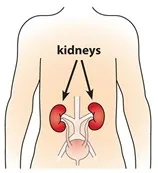Kidney Cancer Awareness Month: Let’s Talk Risk Factors, Testing, and Support
March is Kidney Cancer Awareness Month. Kidney cancer affects the kidneys, which resemble the shape of a kidney bean and are about the size of a fist. They are located above your waist—one is on the right side of your spine and the other is on the left. The most common type of kidney cancer is renal cell carcinoma (RCC), which is seen in 9 out of 10 people with kidney cancer.

Those at highest risk are men and women who have either inherited a disease that increases the risk of kidney cancer or who have parents or siblings who have had kidney cancer. Other risk factors may include:
- being overweight
- having high blood pressure
- being on dialysis
- smoking
- having a job that exposes you to asbestos, cadmium, and certain other chemicals
Keep in mind that more than half of people who are diagnosed with kidney cancer don’t have any symptoms.
Testing for Kidney Cancer
If you have health concerns that could be a sign of kidney cancer, your doctor will ask you to have some tests done. These tests could include:
- urine tests
- blood tests
- imaging tests to get pictures of your kidneys
After your test results come back, and if a tumor is found, you may need to have a biopsy to remove a small piece of your kidney tumor to check for cancer cells. If you have cancer, you will likely need to have surgery to remove the tumor along with part or all of that kidney.
Kidney Cancer Resources and Support
If you are living with kidney cancer or are a caregiver to someone with kidney cancer, the Cancer Support Community offers a variety of resources to help ease the burden of your journey.
- Learn more about kidney cancer, including risk factors, testing, different treatment options to help you make informed decisions, and how to cope.
- Connect with our Cancer Support Helpline by phone or online. Our experienced Helpline staff are here to offer free navigation for cancer patients or their loved ones.
- Create a personal support network where you can document your journey and receive support from friends and family along the way.